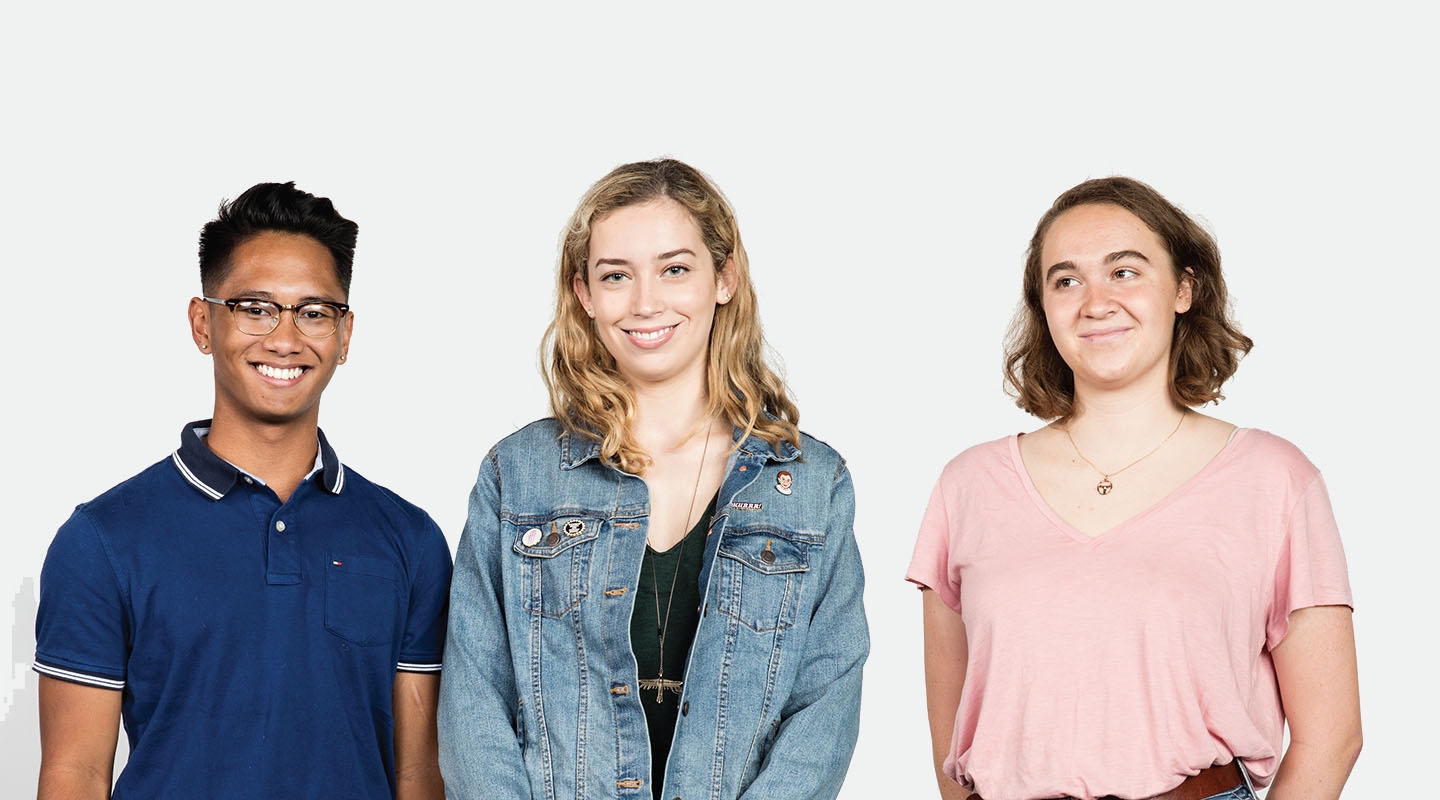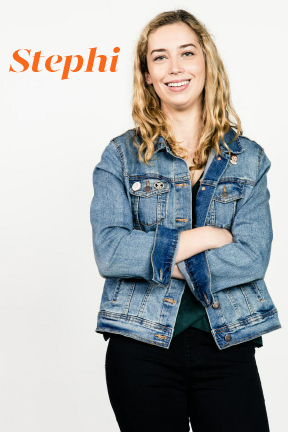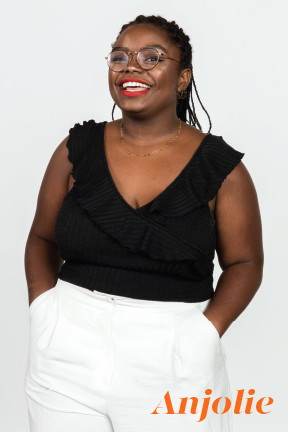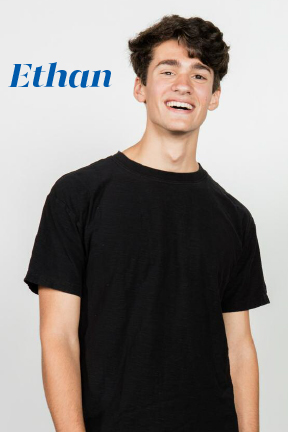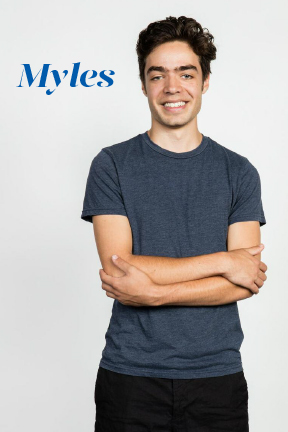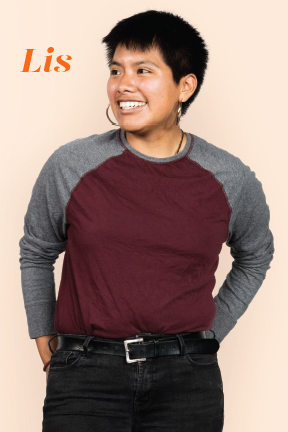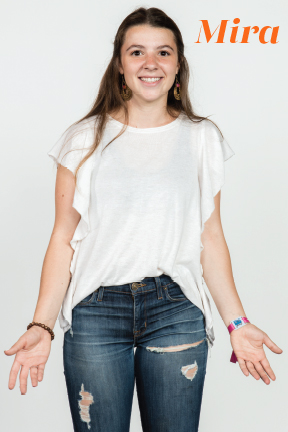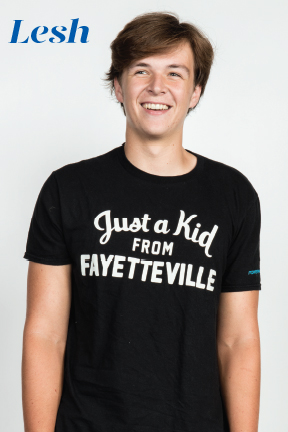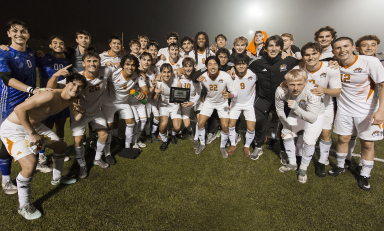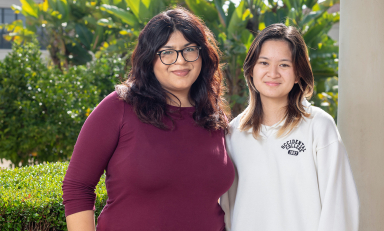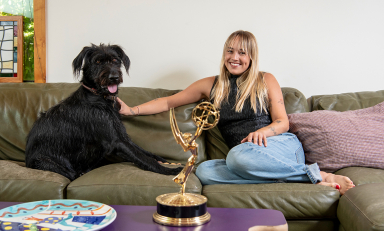The Class of ’22 has arrived at Oxy—and if first impressions are any indication, we’ll be talking about these Tigers for years to come
Here’s what the numbers tell you about the 566 members of Oxy’s Class of 2022: 12 percent are the first in their family to go to college. 8 percent of them have alumni ties. 32 percent speak a language other than English at home. 57 percent are women, 43 percent are men, and 35 percent of them are Californians. 23 first-years come from China, and another 18 of them hail from 15 countries on five continents. They belong to Oxy’s most selective class in 70 years, with an admit rate of 37 percent out of a record 7,281 applications to the College. But looking beyond the numbers, here’s what the people who know the Class of ’22 best—Oxy’s tireless team of admission officers—tell you about the first-years you will meet in the profiles that follow: “A force for good in her community.” “Insane recommendation letters.” “Never boring, never bland.” “Unabashedly passionate about making the world a better place.” “His heart led him to Oxy.” Let’s get to know them on a first-name basis.
Matt
“I grew up right here in Highland Park, so I would always drive past Occidental, but I never actually stepped onto the campus until I was admitted,” says Matt Almazan. “It feels like a different world. There are almost no palm trees. It doesn’t even feel like I’m close to home.”As a student at Franklin High School, Matt spent the last two years competing on the Academic Decathlon team—a contest covering 10 fields of study (such as art, math, and science) with a common theme. “My junior year it was World War II,” he explains. “Senior year it was Africa.” The team finished third and fourth statewide, respectively, in 2017 and 2018—and the experience made Matt a stronger student, sparking an interest in economics that he plans to pursue as his major at Oxy.
To fulfill his Cultural Studies Program requirement—a staple of the first-year curriculum—Matt is taking Philosophy in the Twilight Zone, taught by professor Saul Traiger, which examines the philosophical concepts behind Rod Serling’s classic series (and more contemporary “Zone”-inspired progeny such as Netflix’s “Black Mirror”). “Sometimes watching an episode makes me very anxious before the tension is finally released,” he says of the show’s signature twist endings.
Outside of his studies, Matt is planning to join Archery Club “because I’ve never done that” and Dance Production “because I really love dancing.” As a high school freshman, “One of my friends asked me to be in her quinceanera, in her court, and initially I wasn’t feeling it,” he admits. “I thought I really sucked at it, but after I learned the movements of Latin dancing, I loved it.” Subsequently, Matt was invited to an additional four quinceaneras. (His three favorite dances? “Bachata, cumbia, and banda. They’re all different tempos of musics and different steps, but I really love them all.”) Despite the countless hours he devoted to Academic Decathlon, Matt insists that he hasn’t lost his moves: “My mom says dancing is valuable. It can always get the party started.”
Stephi
Stephi Howard’s college counselor at the Lovett School in Atlanta—who also happened to be her homeroom teacher—“made fun of me for being Goldilocks, because I didn’t want to be in the South, but I also didn’t like the cold, and I wanted a very small school,” Stephi recalls with a laugh. In November 2016, she visited Oxy for the first time, “and within five minutes of the tour my mom whispered to my dad, this is where I was going.” Stephi bought an Oxy sweatshirt at the bookstore that day, “and every time I would take the ACT or anything regarding my future, I would always put it on to remind me of my goal,” she says.That November was auspicious for another reason. Following the results of the 2016 election, Stephi developed a passion for social activism, respectful debate, and various causes. When politics and other hot-button topics would come up for discussion in the classroom, “My classmates were very surprised at the beliefs I held and not necessarily in a positive way,” she explains. “I had to make the choice: Do I want to stop speaking my mind and basically make high school more bearable, or was it more important to me to speak up for what I believed in— no matter the consequences?”
In the end, Stephi held strong to her beliefs: “I lost some friends, but I found other friends who were more similarly aligned to me,” she says. “Some days I regretted it, but you learn the most from the things that are hardest. I’m very grateful for the experience in that I found my fire—I want to help people.”
Coming to Oxy posed a different challenge than high school. “I was hesitant to go to a place expecting that people would have a lot of similar beliefs to me,” Stephi admits. “I had grown so much being around people having very different opinions. Yet I have found that even when they share a similar ideology, people come at a subject with such different perspectives. They are showing me ways to think about things which I have never thought, which is really exciting.”
Stephi originally intended to pursue a political science major at Oxy, she says, “but when I read the description for critical theory and social justice, my brain exploded. Currently I’m taking the intro course [CTSJ 101], which is very dense: Karl Marx’s Manifesto and a lot of very intense reading. I said to my parents, ‘If I take CTSJ as a major, what career do I go forward with?’ And my parents said, ‘Right now you need to pursue what you truly love.’”
That exploration is part of the beauty of a liberal arts education. “Oxy is very comfortable but not in a way where I feel complacent. I love it here,” Stephi says. “I feel I need to be a tour guide already.”
Anjolie
“Before I knew how to swim I used to always jump into pools,” says Anjolie Charlot of Maplewood, N.J. “My dad would be like, ‘Go! Go!’ That’s the way that I still approach things—by jumping in head first and figuring it out as I go along.” Anjolie—who studied in France for 10 months and committed to Oxy soon after visiting campus for Admission’s MVP Weekend last spring—is eyeing a major in Black studies with a minor in politics or sociology. “The idea of having a Black studies major, especially coming out of the occupation, was really important to me,” she says. The November 2015 occupation of the Arthur G. Coons Administrative Center by hundreds of students precipitated the addition of the major to the curriculum this fall. “One of my missions on campus is to make sure that legacy is carried on and make sure black students have space for that discourse—to ask the hard questions and make sure our answers are heard,” she adds. “Every time you get over a hump there are three more humps to get over.” Anjolie’s extracurricular pursuits reflect a broad range of interests, from Black Student Alliance and Student-Labor Alliance to Surf Club and Pulse Dance Club—“making sure I have some more serious things but also some fun,” she says Oh, and one more thing: “I like to rep the lefties hard because we don’t get our own desks. I’m just saying.”Ethan
It’s been a running joke his entire life that Ethan Hodges was going to Oxy. His parents (Cathryn Campbell ’89 and Craig Hodges ’88) met as students here, as did his paternal grandparents (Diane and Jack Hodges, both 1961 graduates). All his life, his grandfather has been giving him Oxy wear. “There’s a picture of me as a baby wearing an Oxy singlet,” Ethan says. Despite the constant sartorial cues, “I never felt directly pressured to come here,” he insists.What turned the trick? “I think a lot of students will say the same sort of things,” says the Media, Pa., resident. “I want to be a name, not a number. I want that small classroom setting where I can ask questions. I developed a lot of rewarding relationships with my teachers in high school, and I want to continue making those kind of relationships.”
Another factor was meeting track and field head coach Rob Bartlett, although a knee injury over the summer sidelined Ethan for much of this fall. “I ran my first half marathon in seventh grade and a full marathon in ninth,” he says. For his application to Oxy, “I wrote my idiosyncrasy essay on how much I think about what I wear on my feet all the time.” Pointing to his white Vans, he adds, “These are intentional. They’re very thin. I go for foot-healthy shoes. The shoes that we wear oftentimes have really big heels and a lot of cushioning on them. That’s not the way a foot is supposed to function, so the shoes that I wear when I run are really, really thin. They’re hardly even shoes. The goal is making my body function the way it’s supposed to be so that I can get rid of stuff like my knee pain and my hip issues. You’ll never see me walking around with shoes with big heels.”
In addition to thinking about footwear, “I’m really passionate about teaching myself little tricks here and there,” Ethan says. “I taught myself how to do a handstand and how to juggle. I was a terrible whistler, so I committed myself to practice whistling.” He credits an app on his cellphone called Streaks: “It reminds you every day to do activities.” These days he’s working on his language skills as well. “When I go for runs around the neighborhood, I see signs that are Spanish. I’m also hearing Spanish every day now, and I find that stuff really great. If my GPA didn’t matter, in an ideal world, I’d be a group language and philosophy double major,” he adds with a laugh, “because my skill versus my passion is a little offsetting.”
Grace
How small is Grace Meschery-McCormack’s hometown of Sierraville? Smaller than the Class of ’22—by more than 200 people. “I’m always telling people it’s near Tahoe or Reno,” Grace says. “I haven’t met anyone at Occidental who has been there yet.”How many people were in your high school? About 150 total in grades 7 through 12. There were 22 of us in my graduating class. My mom was my high school teacher. Because it was such a small school, she taught drivers ed, film, English, Spanish, and French. My dad is a contractor—he does a lot of solar power and remodeling work. He and my mom recently bought a motel in Sierraville.
There can’t be many of those around. No, no. There’s just this one, but it’s doing really well. Birders come there a lot. We have a lot of guests who like to watch birds or watch stars.
You spent 10 months in France as a Rotary exchange student. How did that happen? My family has hosted Rotary exchange students since I was really small and it’s always been a huge part of my life. Last year I went to Normandy because I really love languages, and speaking French was one of them. I was enrolled in public school, and that was huge. Honestly, if I had not gone to that school and participated in the way I did, I would not have the level of fluency I have now. Because now I’m taking a lot of philosophy classes at Oxy, and before I had left for France I wanted to be an art history major. But after going there and experiencing eight hours a week of classic philosophy classes and really bonding with the teacher, that’s what I’m doing now. It’s not what I expected. And you meet people from all over the place. There were 35 other exchange students and we’d get together once a month. One of the students from my program is from Brazil and lives in my dorm at Oxy. I would not have expected that she’d be right down the hall from me and we would become best friends. We speak Portuguese together.
When did you decide that you wanted to attend Oxy? I had come down here for Admitted Students Day. I took a mock class called something like Race, Gender, and the Female Body. It was super incredible and really well done. We spent a day on campus and I got to explore the L.A. area with my family. Then I went home and I couldn’t choose between Oxy and Bard College [a small liberal arts college in upstate New York]. A little later I remember getting an email from a former Bard student saying he had to use a UV light during the winter for Vitamin D. Oxy just seemed really cool, and the small class sizes for me was just so important. Plus, there’s sunlight.
What activities interest you at Oxy? I am joining the International Students Club. Even through it’s technically not for me, I’m going to wiggle my way in somehow. I also signed up to be a group dialogue facilitator at a high school through the Neighborhood Partnership Program. One totally wild thing I did that I didn’t think I’d do was I applied for The Fang, the comedy magazine. I haven’t heard back yet, but even filling out the application was super funny.
Do you write? Do you create? I got into travel drawing the last few months. One of my more formative experiences was when I went on a bus trip around Europe with 60 other exchange students. Fifteen minutes into the trip, I dropped my phone into the toilet. We hadn’t even left France yet—it was a nightmare. So, in order to preserve my memories, I was forced to paint a little bit.
Instead of taking pictures, you wound up painting? Yeah, because I had no way of taking photos. I had these little notebooks, and this paintbrush that had water inside it already. And so I would just run around really quick like sketching and painting things.
Have you drawn anything since you’ve been here? A little bit. I went up to the garden behind the President’s House with some friends, and we just painted and colored. It was really fun.
What’s your favorite thing about Oxy so far? Professor [Damian] Stocking, and his class called Style and “Substance”: Philosophy and the Arts. It’s like everything I’ve ever thought about, he put into words in an hour and a half. It was just incredible. I mean, all my classes are really amazing and we talk about stuff I’ve never thought about, but this one is different. It’s just like, whoa. And everyone in that class is aesthetically very beautiful. It’s been a blast so far. I’m so happy I made this choice.
Sylvia
“Since primary school, I have read a lot of books, from theoretical physics to history stories of ancient China,” says Hanyun “Sylvia” Lou. Her favorite author is Isaac Asimov (“I love The End of Eternity! The Gods Themselves is also really good”), and during a monthlong stretch in high school she devoured most of the novels of Hermann Hesse (“My favorites are Steppenwolf, Narziss und Goldmund, and Das Glasperlenspiel”). “The city library is near my high school, so I could go almost every day if I wanted,” Sylvia says. She was attracted by Oxy’s commitment to social justice, and her Cultural Studies Program course, Expulsions, examines migration, refugees, and statelessness. Her range of interests knows no boundaries: Inspired by the Japanese manga series character Detective Conan (“She’s a master at biochemistry—when I was young I really admired her”), Sylvia built a chemistry lab in her study, growing a crystallized gold slide from materials ordered online. “I like to try new things,” the Hangzhou native adds, and she looks forward to being active in Oxy’s Ski and Snowboard Club: “I really want to learn to ski.” Her verdict on tacos? “They’re too spicy. I do not eat spicy foods.”Myles
When Myles Hultgren was looking at colleges, “I really wanted to move away from Minneapolis, just because,” the native Minnesotan admits with a laugh. “So the location was definitely part of that.” Myles—who created an app for the Android device as a high school senior—plans on majoring in computer science, “but I’ve always enjoyed learning things like philosophy, so I wanted to go somewhere where I could do that.”What are your early impressions of Oxy? It’s beautiful. The classes are all amazing. The Cultural Studies Program I’m taking is Los Angeles From Local to Global—and that relates to what I’m doing. Maybe I’m putting too much weight into my classes, but they feel transformative.
What has surprised you the most so far about the College? I think just how easy it was to adjust. When people would tell me it was going to be hard, I’d kind of brush it off, but it is a big adjustment. I’ve done good, though. It’s only been three weeks but I feel like I’ve been here longer.
Outside of class, what activities are you looking at? Frisbee was a really big thing in my high school that a lot of my friends did, so I want to do that here and get better. And my mom was always really good at dancing, so I want to do that, too. Another one I heard about on the tour that I want to join is the Mixed Race Club. My mom is black and my dad is Swedish.
What’s your app? It was a choose-your-adventure game called Mages and Monarchs. I didn’t publish it thinking it would be big or that I would be a millionaire, I just wanted to do it to see if I could. So I just told people to try it and then I tested it myself. It felt good just looking it up and being able to see it, you know.
Lis
“I never thought of myself as a leader,” Lis Jimenez says, but the first-generation college student’s accomplishments suggest otherwise. As a junior and senior at Oakwoods School in North Hollywood, Lis led the LGBTQ+ Alliance and Latino Affinity Group, and co-founded the People of Color Feminists Club. “There were other clubs on campus that talked about gender equality in the ‘third world,’ but not about gender relationships within the school,” says Lis. “I thought, why don’t we have an official club where we can get funding, with actual meetings in an actual space? I wanted to connect the young kids with the older kids, especially during the college process.” A lot of students have since joined the organization, Lis adds: “Now it’s more of a joint club with other cultural clubs. We all mix in together.”Growing up in a single-parent household—Mom immigrated to Los Angeles from Mexico when she was 12 and is a housekeeper for a family in Studio City—“I honestly get a lot of strength from my mom,” says Lis, who lives in a guest house belonging to a family friend and her three sons “who became my second family.” A budding filmmaker, “I make documentaries and narratives and experimental art films mostly about cultural identity,” Lis explains. “I made a film about my mom and my second mom’s stories.” Another film, La Persona, “was more experimental. It shows me basically putting a bunch of stuff on my face: ground-up coffee beans to represent my indigenous Mexican cultural background; lotion over the coffee beans to represent the whitewashing of myself; and confetti over the lotion to represent my LGBTQ+ identity.”
Lis took a look at Oxy on the advice of Oakwood counselor Steffany K. Perez ’94: “She knew that I loved being able to engage with students about social justice, not just teachers,” recalls Lis, who is the recipient of a Point Foundation Scholarship (a highly selective merit-based scholarship for LGBTQ+ students). “My mom was on the tour with me, and she got a feeling I would be safe here.
“Being indigenous was a big part of our culture,” says Lis, who is looking at a double major in critical theory and social justice coupled with media arts and culture. In their application to Oxy, Lis wrote an essay about traveling to Chiapas, Mexico, in connection with the Oakwood School Chiapas Project, which sells artisan products such as sweaters and bracelets made by more than 200 Mayan women. “We sell at a high price so they can send their kids to school and build their homes and have a better life,” Lis says. “So, I talked about that and having my relationship between being a person of color in America and also my mom being indigenous and being faced with the reality of what it would have been for my mom to stay in Mexico and lead her life there as opposed to coming here. I talked about the complexities of the Mexican culture and American culture and how I don’t fit in with either.” Take it from us: Lis is a natural fit anywhere.
Mira
Mira Tarabeine was born in Los Angeles and grew up in Damascus, Syria. Her father took over the family printing business, and although she saw a lot of poverty around her, “I knew we were blessed,” she says. When war broke out during the Arab Spring in 2011, “It wasn’t very close to us but we still would hear about it on the news.”That quickly changed in 2012, when a bombing occurred less than a half-mile from their home. “We had the windows taped in our apartment so they wouldn’t shatter, and we moved our beds so they faced away from the window,” she recalls. “It felt like an earthquake and that was very uncommon. A week later, we left the country. My parents didn’t tell me until the day before and I had to go to school and take all my things. I didn’t really get to say goodbye to people.”
After finishing out the school year in Phoenix, with five people living in a two-bedroom apartment, the family relocated to Beverly Hills, where “my uncle had an apartment and let us stay there. We had eight people living in a one-bedroom apartment—my grandma, my aunt, me and my mom, my three siblings, and my dad. Basically my dad lost his entire business and everything he had ever worked for.” But she and her siblings were able to enroll in a good school system—“Going to college in the U.S. was always my mom’s goal for me and my sister”—and it was at Beverly Hills High School, after Mira joined the volleyball team, “that I feel like I found my voice.”
Over the course of her senior year, Mira made the effort to educate her school district on the refugee crisis with an assembly she called “Kids Are Not Invisible.” Each assembly began with the same two questions: “How many of us in here are first-generation immigrants? How many are second-generation immigrants?”
“When I asked first-generation, about 10 percent of the room stood up,” she says. “When I asked second-generation, it was always over 60 percent—during all six assemblies. Throughout each assembly I talked about what’s going on with the refugees, who they are, and then I would ask the question, ‘What makes immigrants different than refugees?’ Because none of them fled their countries because they wanted to leave their families—something drove them out. They needed a better life.” Following her first talk, she received a $500 donation for the Karam Foundation—a nonprofit organization whose mission includes taking kids out of low-paying child labor jobs and putting them in school. “I told everyone it’s a big problem but we can start by educating one child.”
For middle- and elementary school audiences, she created a “very childlike book” that illustrated the refugee crisis without using the word “war” through the perspective of best friends Mia and Tia. “I’m trying to get it printed,” says Mira, who hopes to travel to Lebanon next summer to teach English to children living on Turkish campgrounds so they can be integrated into the Lebanese school system.
Meanwhile, she’s embracing all that college has to offer. “I am so in love with Oxy’s commitment to community,” Mira says. At September’s Involvement Fair in the Quad, “There were all of these little community engagement programs,” she adds. “I think I signed up for all of them.”
Lesh
As a junior defensive end for the Fayetteville (Ark.) High School Bulldogs, Lesh Chadick broke his right hand during football practice in the middle of AP test season. That didn’t stop him from taking his tests—“I got accommodations so I could type in extra time for something”—or from getting back on the field. “I had a cast over my hand and extra padding,” he says. “I wrapped it up and went out and played.”That fall, Fayetteville won its second consecutive state championship in football and its fifth in a decade. And Lesh grinded through enough AP courses during high school—13!—that he bypassed his freshman year altogether entering Occidental this fall: “It was definitely taxing, but I’ve gotten into the college of my dreams, I’m getting to play football here, and I’m coming in as a sophomore.”
Lesh was recruited to Oxy by assistant football coach and co-defensive coordinator Ricky Lang, but it was his homeroom teacher and college adviser, Ellen (Bogart) Reynolds ’08, who helped seal his decision. “She loved her experience at Oxy and helped me learn more about the College,” he says. “I was looking for a place where I could explore everything that I wanted to. A liberal arts college is a great place for that—it’s all about finding out what you love.”
Lesh’s parents, both graduates of the University of Arkansas School of Law, have encouraged him to get out of Fayetteville and see the world. While in high school, Lesh visited Berlin for an extended stay and became “immersed in everything,” including speaking German, he says. “A lot of the kids there liked the same stuff we like here, just in a different language.”
His dad, Vincent, is of counsel at Quattlebaum, Grooms & Tull and is an adjunct lecturer at the law school. His mom, Terri, is associate director of career services at the law school. His brother, Eli, a high school junior, “is interested in Oxy because I talk it up so much.”
As for his early impressions of the College, “It’s very different from home,” Lesh admits. “Fayetteville is a pretty liberal place, but it’s Arkansas liberal. So it’s been a straight-up culture shock when you’re on one of the most liberal college campuses in America.”
Despite the head start on his education that his AP credits have given him, Lesh (who is eyeing a major in physics) has no plans to rush through his Oxy education. “I could use that four years and I have time to play around,” he says. “If I decide to switch my major, it can help me through some of that stuff and not leave me behind.”
Besides, he adds, “I’m all in for this football team.” After a 2017 season cut short by an injury-plagued roster, the Tigers returned to play September 1 with a road trip to Mexicali, Mexico, and a 20-0 win over CETYS University. After the game, “The teams got together for a picture and everybody was happy and celebrating,” Lesh says. “It kind of tore down borders, even though we didn’t speak the same language. It was just a really cool experience. You’re not going to meet a lot of people that can say they’ve played a college football game in Mexico, but we did.”
What’s the mood like on the team? “Everyone’s re-energized about everything,” Lesh says. “We’re all so excited and going into it and attacking it head on. There are a lot of freshmen on the team and the three seniors and upperclassmen have shown us what to do: how we practice, how we get better. They’re all in on this football team even if they might not see the returns this year.”
Lesh’s enthusiasm for sports spills over into podcasts, and he hopes to find an outlet for his own opinions. “I’m thinking about getting involved with KOXY at some point,” he says. “I want to get some kind of radio show going even if no one’s listening.”
Photos by Max S. Gerber

